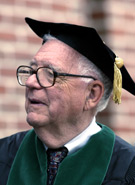Dr. Eugene Braunwald

Doctor of Science
“Most heart attack survivors have never heard of Dr. Eugene Braunwald,” The Boston Globe stated in May 2002, “but chances are his research helped save their lives or improve their recovery.” Braunwald, whose family came to this country in 1939 after fleeing Nazi-ruled Austria, is a premier cardiologist of our time.
His stature, the Globe continued, “is anchored in his landmark 1971 discovery that a heart attack is a progressive event. His insight that doctors could intervene…to reduce injury to the heart opened the door to the entire field of modern heart-attack treatment.”
At Harvard Medical School, Braunwald is the Distinguished Hersey Professor of Medicine and faculty dean for academic programs in the Partners HealthCare system, founded by the Brigham and Women’s and Massachusetts General hospitals.
Braunwald graduated first in his class of doctoral recipients at New York University, where he also earned his A.B., and completed his residency at the Johns Hopkins Hospital. He served as chief of cardiology and clinical director at the National Heart, Lung and Blood Institute; founded the department of medicine at the University of California, San Diego; and from 1972 to 1996 chaired the department of medicine at Brigham and Women’s Hospital.
The only cardiologist who is a member of the National Academy of Sciences, Braunwald has received countless awards and honors. In 1996, Harvard created the Eugene Braunwald Professorship in Medicine as a permanently endowed chair, and in 1999 the American Heart Association established the annual Eugene Braunwald Academic Mentorship Award. Braunwald has written more than 1,100 publications, been editor-in-chief of the leading textbook in internal medicine, and is the founding editor of Heart Disease, the leading cardiology text.
Braunwald is a music lover who as an undergrad carried a spear in a Metropolitan Opera production of Aida. He is the father of three daughters.